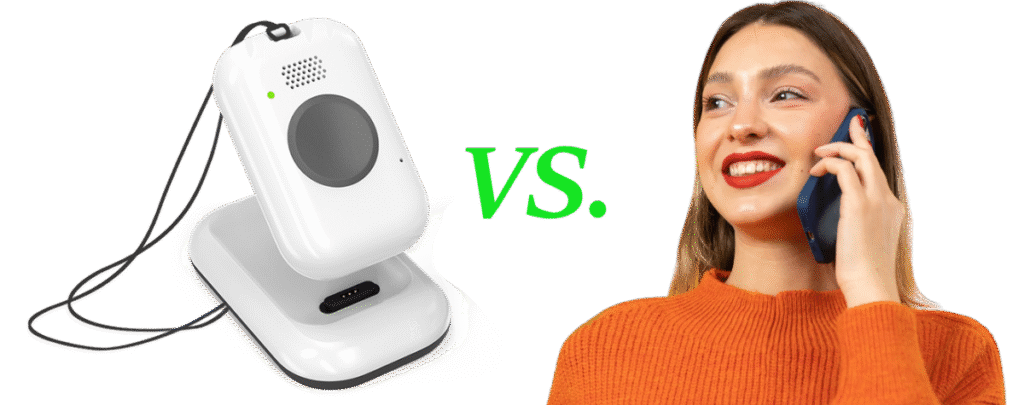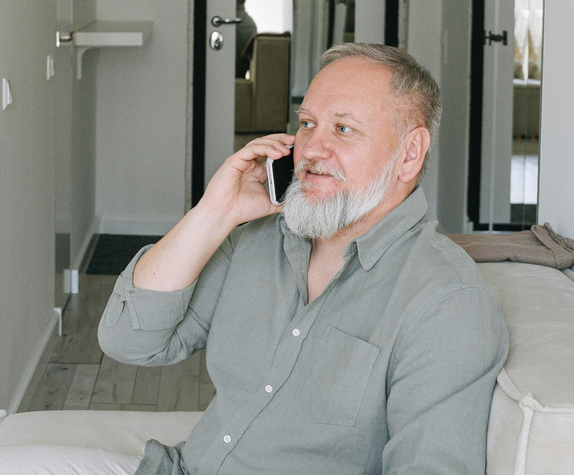What’s your experience with medical alert devices vs. daily call services?

Medical alert pendants and daily call services like Verocall tackle different elder care needs. Pendants are for emergencies like falls; call services check in regularly to confirm well-being. Neither is perfect—both have costs, benefits, and issues, especially when seniors’ pride gets in the way. This article compares the two, using real stories from Reddit and elder care forums to show why seniors often don’t use pendants and how call services can sidestep some, but not all, of those problems.
Medical Alert Pendants: For Emergencies, If They’re Used
How do medical alert devices work?
Pendants or bracelets like Medical Guardian or LifeFone let seniors press a button to call for help. Many, like Philips Lifeline, have fall detection that auto-alerts a monitoring center, which contacts family or 911. Some work only at home; others, like Medical Guardian’s Mini, use cellular for use anywhere.
What are the costs of medical alert devices?
- Monthly Fees: $30-$50, depending on features like GPS or fall detection. LifeFone’s at-home system starts at $31/month (annual plan); Medical Guardian’s mobile units hit $50/month.
- Setup Fees: One-time costs range from $40-$198 for activation or equipment.
- Contracts: Some, like Life Alert, lock you into multi-year deals.
When are medical alert devices better than daily call services?
- Fast Help: Response times can be as quick as 7 seconds (e.g., Alexa Emergency Assist). Good for falls or sudden health crises.
- Fall Detection: Auto-alerts help if a senior can’t press the button.
- Mobile Use: GPS models work outside, great for active seniors.
- Caregiver Relief: Knowing help is a button away eases worry.
What are drawbacks of medical alert devices?
- Seniors Don’t Wear Them: Pride or discomfort stops many. One caregiver said, “Our mom refuses to wear her Medical Guardian pendant, saying it’s ‘too expensive’ even though we pay for it.”
- Forgetting the Device: Dementia makes it worse. A Reddit user noted, “The individual has to remember to put the pendant on, which isn’t something a person with dementia will do.”
- Not Pressing the Button: Pride or not wanting to “bother” anyone is a huge issue. Reddit stories highlight this:
- “My grandmother was in so much pain from a UTI but wanted to wait until the next day. My aunt found her basically unconscious. She was rushed to the hospital, unconscious for 5 days, then miraculously woke up.” (@u/throwaway123456, r/agingparents)
- “My Mom passed out and hit her head in the bathroom. She didn’t press the life alert button until 6am because she didn’t want to wake people up? Thank god she had one because she lives alone.” (@u/caregiverwoes, r/eldercare)
- “We had a button for Mom next to her bed and toilet. When her supplemental oxygen caught on fire and burned her face, bedding, and clothes, she waited three hours till I woke up for work instead of pressing it. She’s fine, relatively, but this could’ve been VERY bad.” (@u/sleepy_caregiver, r/agingparents)
- “My dad fell in a parking lot and didn’t use his bracelet. He wasn’t even supposed to be driving. The broken hip was the start of the end.” (ElderCareForum.com)
- False Alarms: Necklaces can trigger when bending over; bracelets are better but not perfect.
- Maintenance Hassle: Charging (e.g., Apple Watch) or battery swaps can be tough for tech-averse seniors.
Daily Call Services: Checking In Without the Button
How do daily call services work?
Services like Verocall or CareCallingNow call seniors daily, either automated or with a real person. No answer? They alert family or neighbors. It’s about regular check-ins and preemptive action, not emergencies. Verocall builds a well-being picture over time, changing discussion topics to draw out important changes in living situation, health and safety. For example, Verocall’s trained auto agents will mention recent scams or likely hazards and will steer the discussion to how to avoid them in the context of the loved one’s living situation. In addition,, the agents have the time to discuss literature, history, gardening, or other topics that elicit positive engagement.
What are the costs of daily call services for seniors?
- Monthly Fees: $19-$30, often cheaper than pendants. Caregivers on Reddit call Verocall “affordable” at $19 with no gripes.
- No Equipment: No devices to buy or maintain.
- No Contracts: Flexible plans, often customizable for one or two calls daily.
What are the benefits of daily call services for seniors?

- No Action Needed: If a senior doesn’t answer, the system flags it, dodging the pride issue. A caregiver said, “Verocall’s well-being texts let us know Mom’s okay without her needing to do anything.”
- Non-Invasive: No wearable, so it feels less like a medical device. One caregiver shared, “Mom didn’t want to talk to a machine, but we said it’s like an answering machine. Now she likes it, even got blueberry plant tips.” (post in Reddit r/eldercare)
- Reduces Isolation: Interactive calls offer a touch of social contact. A Reddit user said their neighbor, grieving a friend who used to check on her, felt safer with daily calls (@u/lonely_neighbor, r/eldercare).
- Summaries to care circle: Elders are often more open with a conversational agent than with their own kids. Users of Verocall have appreciated call summaries that included phrases like, “my new boyfriend” or “the neighbors built a fence in my backyard” to “the IRS is coming by tomorrow to collect payment.”
- Flexible: Calls fit the senior’s schedule and can be multilingual.
What are the drawbacks of daily call services for seniors?
- Not for Emergencies: No real-time alerts for falls or crises. If a senior falls and can’t reach the phone, the system won’t know until the next call.
- Phone Access: Seniors need to be near a phone and able to answer.
- Limited Scope: No GPS or direct 911 connection, unlike pendants.
- Missed Distress: If a senior answers but doesn’t mention a problem, issues can go unnoticed.
Why do seniors resist pendants and bracelets?
Seniors often see pendants as a sign of weakness or don’t want to “make a fuss.” Reddit is full of stories:
- “It’s this generation. My grandmother had a stroke in the early morning but waited till we woke for work to ask for a ride to the hospital. It’s infuriating. Being on fire is the very definition of needing help.” (@u/frustrated_kid, r/agingparents)
- “My cousin’s neighbor fell twice with her phone in reach but didn’t call 911, waiting hours for help to avoid a scene.” (ElderCareForum.com)
- “My dad refused to wear his pendant, kept it in his pocket. When he had a stroke, it was useless.” (Reddit, r/caregivers)
Daily call services get around this by not requiring the senior to act. No answer is the alert, so pride doesn’t stop the system from working. A Reddit user explained, “My mom ignores her pendant but answers Verocall’s daily call. If she doesn’t, we get a text and check on her.” (@u/peaceofmind22, r/eldercare)
What are costs and trade-offs of pendants vs. daily call services?
Pendants cost more ($30-$90/month plus setup) and need seniors to wear and use them, which they often don’t. Call services are cheaper ($19-$30/month, no equipment) and don’t rely on the senior acting, but they’re useless for immediate emergencies. Some families mix both: an Apple Watch for falls and Verocall for daily checks.
Navigating Pride

Pride is the real hurdle. Seniors don’t want to seem frail or bother anyone. Pendants scream “I’m old,” and pressing the button feels like admitting defeat. Call services feel more like a friendly chat, less medical, so they’re often easier to sell. One caregiver said, “We told Mom Verocall was like her old neighbor calling to chat. She tried it and loved it.” (Reddit, r/agingparents) Still, it’s a negotiation—frame it as a tool for their independence, not a crutch.
No system is foolproof. Pendants save lives if used; call services catch issues if the senior doesn’t answer. Talk to your loved one, figure out what they’ll actually use, and go from there.
